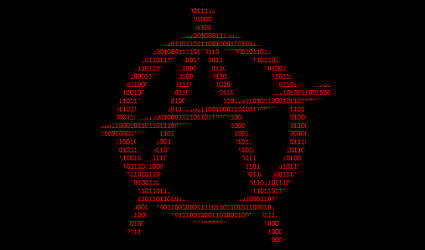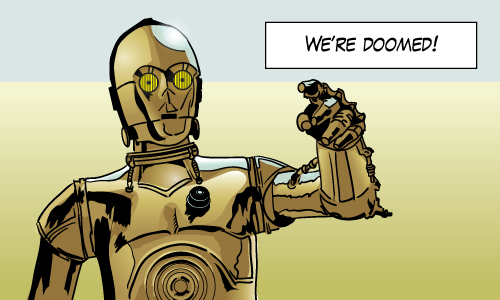Anarchy is a Cool Idea…But can it Actually Work?
For the mainstream ANARCHY = CHAOS. Most people can’t get their head around the idea that we might not need a governing authority. After all, who will protect our safety? If we have Anarchy then won’t people just go around killing each other? In my adult life I have always been a Libertarian, but since coming to STEEM I have been wrestling with this idea that Anarchy might be possible and STEEM might just be the social experiment that could prove it.

Source
If we have a look at dictionary.com it has two distinct definitions for Anarchy that really do starkly contrast the views for and against Anarchy. Check it out :-
#1. a state of disorder due to absence or non-recognition of authority or other controlling systems.
#2. absence of government and absolute freedom of the individual, regarded as a political ideal.
So #1 defines it as a State of Disorder. Sounds like chaos to me and that is how I would label the mainstream view. #2 defines it as a political Ideal. It’s an ideal that seems to be quite prevalent among many users here on STEEM which is possibly the greatest Anarchic social experiment of the modern age. But can Anarchy ever be more than an ideal? Can Anarchy actually work? Even just here on STEEM? Well, finding the answers to those questions is one of the main reasons why I am still here.

Source
As a Libertarian I have been pretty anti-government and anti-authority for a long time, so I do have a lot in common with some of these Anarchist idealists, but I’ve always felt there needs to be something to save us from the utter lawlessness and chaos that historically has come from Anarchy. We have seen Anarchy in action in the real world where governments have collapsed. It has been very common in Africa and parts of the Middle-East where Anarchy has given rise to warlords, who exploit the lack of authority to kill and maim, then establish fiefdoms and go on to create brutal dictatorships or corrupt systems of government, so Anarchy never seems to survive for long before it turns into something else. So why would STEEM be any different?

Source
I always seem to come back to Culture and Social Norms. Let me give an example. Say you walk into a shop and there are 10 people in the shop already. What do you do? Do you form a line and wait your turn? There is no law that states that you need to line up and wait. There is no law against pushing your way through and cutting in front of others. But if you do it in the West, someone will probably call you out on it. Maybe even all 10 of the others will have a go at you. The shopkeeper might even refuse to serve you for being a dick. It is within the shopkeepers rights after all. My point is that there is no law at play here. There is no authority. What is happening is the people in that shop have established (via common culture) what is considered acceptable social behaviour and they respect it and, more importantly, they DEFEND it. This is what self-governance looks like to me. You are still free to not enter the shop, or even walk out of it, but if you want to opt-in to this community of people and transact in the shop then you need to respect the cultural norm and behave yourself.

Source
So we come back to STEEM. On the blockchain, the only law is the code. If you want to self-vote or sell votes or abuse the platform with spam or shit posts. Well, there is no law against that. But is it considered acceptable behaviour culturally within STEEM? Most would agree that if everyone just abused the platform and tried to extract as much value as they can then it will fail. So if it really is a free-for-all here and nobody cares then this great Anarchic experiment is already doomed.

Source
We have already seen that there are some powerful would-be Warlords here with big guns (STEEM POWER) who would seek to use the threat of force to coerce others into doing their will. We’ve seen these would-be Warlords beat the bid bots into submission and they have forced a 3.5 day minimum post age as a requirement for buying a vote. I am quite certain this was just one of the opening salvos but it shows where we might be headed if we don’t get it together. This is not Anarchy and it’s not Voluntarism either. It is the same path that Anarchism has been down in the real world so many times. It is the emergence of new authoritarians from the lawlessness that Anarchy allows.
Source
So where am I going with this? I wish I knew for sure. But for now I believe it comes down to us raising the standards for the culture of STEEM, having higher expectations on each other as to what is the social norm and what is considered acceptable behaviour – especially within our Voluntarist communities. Do we have the foresight and the strength to actually do this? Or are we too busy chasing a fast buck ourselves? I am going to try and write a bit of a series to outline a few of the “Grey Areas” that we see on STEEM to try and figure out where that consensus might be about what IS acceptable behaviour. From there maybe we can have a go at collectively trying to defend that behaviour – just like those people in the shop. Maybe together we can even lift the bar a little bit and promote a culture on STEEM that we could really be proud of. I don’t believe that we need an authority to fix problems. We can do it ourselves within our communities, but we need to get our act together.


https://hubpages.com
http://julianakarlo.com
https://www.independent.ie
http://michaeljswart.com
https://steemit.com
Full ancap/voluntaryist reporting for duty:
It can be helpful to draw parallels; but I think we're reaching too far if we use the steem blockchain as an analogy for a country.
It's more like a club, since it has no geographical boundaries.
Nobody is trapped here, and anyone can start their own blockchain or fork this one, and play by their own rules (they'll generally be playing alone, but it's an option)
A state is an entity that reserves the right to aggress against those within a specified area, which is the real crux of the problem.
At the risk of sounding like a 'That wasn't real socialism' socialist; the places where the state has collapsed aren't examples of anarchism, since the people still believed they needed to be governed.
The throne was temporarily empty, but they still had one.
This is a big part of the reason most ancaps aren't out there shooting politicians and policemen.
The problem isn't with a particular group of people, but with the belief that any one group has any right to rule another.
Thanks for dropping in and reporting for duty! If it wasn't obvious from the post I am still trying to get my head around this and figure it out. Maybe you can help me.
I talk about Culture a bit in my post and you mention "people still believed they needed to be governed" and "the belief that any one group has any right to rule another" which I think we are talking about the same sort of thing. It's a way of thinking and behaving that is cultural IMHO. In the West we have a more individualistic culture but we still seem to have this mindset of needing authority or that asserting authority over others is ok. As long as that mindset persists then anarchy can never actually work.
Honestly, I don't know how to get past this without agreeing that it's ok for everyone be self-serving assholes and it's ok to screw each other over. I'd be really interested to hear your thoughts on how we should (or even IF we should) be combating abuse and taking this platform forward because if things don't improve then I am opting out.
If you opted out it would be a sad loss.
I've posted before on the need to return to 50/50 author/curation rewards.
This 75/25 business, combined with the artificially high SBD, means voting power is most productive when self directed.
People will get a return on their SP.
Better they get it by winning fat curation rewards on quality posts than by upvoting low value posts in which they have a personal stake.
Ultimately, a lot of the problems we see will actually be solved by growth.
Let's say we hit 10 million users, and Ashton Kutcher arrives; will my voting power be more productive upvoting his best work, early, or by just upvoting myself?
It won't be long before careful, considered curation will be more lucrative than self upvoting again.
That's when the quality will really rise to the top; and everyone reading this now will be glad they hung around to see it.
That said; I think j2r is doing a healthy thing.
We seem to have developed an all or nothing, cultesque mentality here.
Take a month off. Just don't power down.
Your followers and balance will still be here when you get back :)
Thanks again for your considered responses.
Changing the way the system works is changing the code and since code is law on the blockchain it's effectively changing the law. But I don't think we can assume that the law is going to change. So, philosophically, how does an Anarchist deal with that? How do we deal with that here on STEEM?
When I mention abuse, I don't just mean self-voting I mean plagairism, deception, corruption and fraud plus a host of other forms of abuse I've seen. I am struggling with this philosophically. The Libertarian philosophy has the "Non Aggression Principle" which I often explain to others as "You can do whatever you want, as long as you're not hurting anyone" but I don't see Anarchism having the same safeguard. Do we need to form these little vigilante groups (like Steemcleaners) to go after the kind of behaviour that we might consider undesirable? If so, at what point do these vigilante groups clash? Do we form these little gated communities where you can't come in unless you agree to a higher set of rules?
I'm really trying to understand how this could work, but my pragmatic mind just seems to pick holes in the Anarchist ideals and the STEEM platform, as it stands, is a bit of a mess.
All this self voting and vote buying madness started after the last hard fork which made it profitable to do so.
There is no need to condemn bad behaviour if you can make it unprofitable.
But who/how decides what is bad behaviour? Is it up to vigilantes? Does might make right and the one with the most power wins?
Blockchain technology has been built around a core principle of achieving consensus. Why is this any different? Where is the consensus for this Proof of Brain people talk about? I'm not seeing it and there isn't really much evidence that people are trying to see it so is it any wonder this platform has become a free-for-all?
That is clearly bad behavior. And it is being incentivized by the current rules because they are profitable activities since HF19.
A fork could render all of them unprofitable so there is no need for vigilantes.
Don't forget Dan's motto:
The economic incentives in STEEM since HF19 are flawed, proof of brain is no longer the driver of this blockchain.
I wasn't here before H19 but I think abuse would have still been possible with non-linear rewards. Instead of self-voting with 10,000 SP Could I not have spawned 100 accounts with 100 SP each and then set up a curation trail. Wouldn't that have paid out?
Quadratic rewards meant that the bigger the payout on a post, the more your vote would affect it (either up or down).
Its not currently worth downvoting dodgy, overvalued TA crap by 50c compared to just upvoting yourself 50c; but if the choice is between upvoting yourself 5c and downvoting the rubbish by $5, it becomes much more appealing.
That does sound a bit better and it makes me wonder why such a system was abandoned. Maybe there is a clue in all those witnesses who are running bid bots?
I understand Dan had strong views on the topic so maybe we just need to wait for EOS to launch a competitor?
Or for the threat of that to force a reconsideration here.
The closer Dan's thing and steem are, the more steem's network effect will matter.
Possibly. Though I can just imagine the vitriol that will occur in the debate of that scenario so I'm not sure if logic or reason would prevail.
Maybe I am just being too pessimistic and cynical :)
There's a catch: It is costly to spawn new accounts.
Not really. You just need to send VESTS to the new account :-
https://v2.steemconnect.com/accounts/create
Cool post Buggedout, resteemed
Thanks man. Appreciate it.
I don't understand Steemit yet. It took me some time to grasp the etiquette and I still haven't. I don't understand a lot of things. As I'm looking at this post it has 21 views, but 36 votes and very little comment. Are people afraid to participate in something so controversial? There are so many unwritten rules.
And just when I think I have them. I find out I was wrong. I just blocked and muted the warlords almost immediately. I don't understand the bots, so I don't use them (except for Ginabot and something I have to use for Steemengine.)
I'd love to see this platform free'd up, thriving with everything everyone wants. But different communities want different things.
A great man taught me a while back that what's important to me is not necessarily important to you and vice, versa. And that's alright.
This isn't a community. This is a LOT of communities. And they all have things that are important to them. And they don't all understand that what's important to them is useless to the others. I could go on, but I've probably already said something I shouldn't have.
Bang on. This is why many people call Steemit a microcosm of the real world.
I've been here about 8 months and I still haven't grasped the etiquette. It's part of what this post is about I suppose.
Some of the votes I have here are auto-votes from people who support my writing but have not necessarily had a chance to read it yet.
Just to play devil's advocate, I was yesterday at an airport (in a western country with main western people). The security line was a nightmare. There were people (not trying to get flights urgently) who were happily cutting in and pushing ahead. When people piped up, they weren't backed up so they got away with it. The airport people did nothing either.
So, my point is, your shop analogy is an ideal. I think people don't break norms because of the fear of being called out of disciplined in some way. The shop analogy only works when everyone has this communal 'fear'.
If someone cut in and the shopkeeper didn't care (as his right), then the new norm would slowly take hold that that is okay?
Excellent! Love a good devils advocate and I think you might have just helped make my point.
Culture is different in different parts of the world. Where I come from, in small towns there can be a very strong community culture where queue jumping would be totally unacceptable, but in other parts of the Western world - often the big cities - the culture is a bit more apathetic or even people are afraid of challenging the queue jumper. Different countries, different cities, even different workplaces or sporting teams can all have a culture which is different. Same as the communities here or even the broader STEEM community. Culture can change. It can evolve, or even devolve. How would you measure it?
BTW - I don't think it comes down to fear for me not queue jumping, it is about respect. But that is a cultural thing :)
I think 'fear' was the wrong word with the wrong nuance. Even respect is something that is born of a partly non altruistic hope for reciprocal respect (maybe completely, but in part).
Soberly, cultural norms are born from specific times, backgrounds and shared expectations. But I think in all cases the norm needs in part to be enforced. Not too much, or you have a dictatorship, but not too little either.
I once read a paper about the evolution of good and selfish nature's and how to find a mathematically stable balance. In the end, it was modelled that you needed a certain balance of the two for an optimally stable system.
Finding out that balance non mathematically and in a non trivial system is a touch more difficult though. Sorry, must get back to work!
EDIT:
So, during that session I was thinking. The smaller the community, the less the need for central authority. I would suggest this is because your reputation is more valuable in a small community. In a large one, you are not likely to come across the same person ever again...
Another thought, I guess the absolute ideal of anarchy should not preclude people forming groups and "imposing" their views and values through a sort of central authority?
Thinking on both your comments in this thread. In the first one, you are quite right. Cultural norms vary from place to place. I believe it is Italy where they don't have a concept of queuing, it's pretty much a free for all. In airports it's likely staff won't intervene as they would fear being called out for racism (or culturalism if that's a thing) if they told someone not to queue jump.
I also totally agree that smaller communities is probably the only way anarchy can really work properly. The bigger a community gets the more disagreements you're going to get and that will then start calling for some sort of authority again.
In my experience, pretty much all of mainland Europe hasa different sense of queues compared to Anglo countries. But that if course is a vague generalisation...
In the larger community, power centres (due to central authorities) begin forming. These will again start to try and impose their will. Coordination of Individualists and anarchy is like herding cats...
I started a series on this a few months ago and never got past the first post. I'll be interested to see what you come up with.
Thanks. I am tempted to have a read of your work on it but maybe I'll be influenced by it and not get past the first post either :)
Send me some links after I'm done?
Sounds like you are making the beginnings of a government (small g).
As more hands get involved, each party interested in new rules to further their goal, restrictions, and oversight of the masses, it will evolve into The Big G.
You might be right. As a Libertarian my tendency is toward small g anyway. But I think the key here is that if everything remains opt-in then we can maintain individual freedom and independence, so it can not become an oppressive all-encompassing Big G.
Yes. And I didn't mean my comment above to be negative at all either. Just seems like it's the unsolvable problem.
A group has a good idea to be equal and fair, start something new. Human nature, Leaders emerge...be them good or greedy.
Likewise followers emerge. Those who would rather follow any idea, than come up with their own. Greedy people ruin every plan. Like you said, you see it already on this platform.
I think education on Natural Law will help, but so few are educating people on it.
It's a good point. Though I personally find the concept of Natural Law to be a big vague and too frequently linked to religion. Maybe there is something here though.
Mark Passio on youtube has the best educational series on Natural Law. It's long but worth watching.
You know this is a topic of great interest for me. It would be great if people were willing to a) participate in a discussion, b) come to some consensus, c) accept the consensus (at least to try and tweak if necessary), d) really try to act act accordingly.
I wonder what that would even look like here. Especially when communication is tough to even establish. I think it needs to be attempted, though, so I look forward to your series. :)
Thanks. It may be futile but I think it is worth a try.
There is so much potential here I really believe it could be awesome. I think I am up against a fair amount of apathy, cynicism and general self-interest. But we will see. The first 2 can be overcome if a handful of people are prepared to lead by example. I'm still trying to figure out if that handful of people is coming out of MSP.
I agree with the three problems that a discussion like this will be met with. Unfortunately, a fourth one, visibility, is going to factor into it. I hope this is an exception to what's become the rule around here, but the major players need to see the series (along with a good portion of the rest of us), if it's going to be something discussed, solved and adhered to by the community.
You are right of course. You may have just talked me out of writing it, LOL :)
Please write it. Then solve two major problems with one series of posts. No pressure. :)
Ok, the first one is about Self-Voting and you can find it HERE
I agree, it is a very interesting topic of discussion...for a website such as Steemit. In the real world it just can't and hasn't worked, as outlined from the Africa topic as an example. In the real world their are just too many factors that need to be governed, in my opinion, or policed. Even though people don't want to admit it, we are all just looking for someone to tell us to do/not do something, which is not how Anarchy works.
Explain the lack of warlords in Zomia, an anarchist society that is over 100 million strong and 2000 years old, made up of 5 distinct cultures.
I understand what you're saying regarding governance. However, I do believe we could solve any number of issues on our own if enough of us wanted to, and we had a better vehicle for getting the news around.
I don't need to be told what to do. I think I've carved out my stance and way of doing things quite nicely on my own. I think many here have. I think what I want is consensus. A path forward. A way to do what I feel I should do without it royally making someone else upset at me for it. :) Which as far as I can tell, means not taking "too much" from the reward pool, whatever that means.
If anarchy works, it's because a group of disparate thinking individuals have enough respect for one anothers' thoughts and opinions to allow it all coexist, with hopefully exceptions made for practices that damage more than the individual, or that threaten to destroy the ability for participants to think and speak their opinions and live accordingly.
It is good that someone open this theme seriously here on Steemit. Two extremes govern our behavior. On one side is greed and selfishness and on the other the need to be social and connected.
In my opinion anarchy is equilibrium of this two extremes. We have auto control our greed and selfish nature to achieve fair and productive social bonds.
So your example of peer to peer interactions between individuals in the shop is very good plain example to explain more elaborate description of anarchy I made in my above attempt.
This post deserve to be resteemed!
p.s. It's interesting how many times a reminiscences to my post @ I wrote few months ago come over and over on the surface, when I find post like yours here on Steemit. I be glad to hear a opinion on mentioned post from you too.
I like your post and I commend you on making an effort at positive change. Self-voting is actually one of the first grey areas I was going to write about, so stay tuned!
Your response motivate me to write a new post continuing debate from here on. Check it here @.
Nice one. I did a piece on Self-Voting today HERE if you're interested in my take on it.